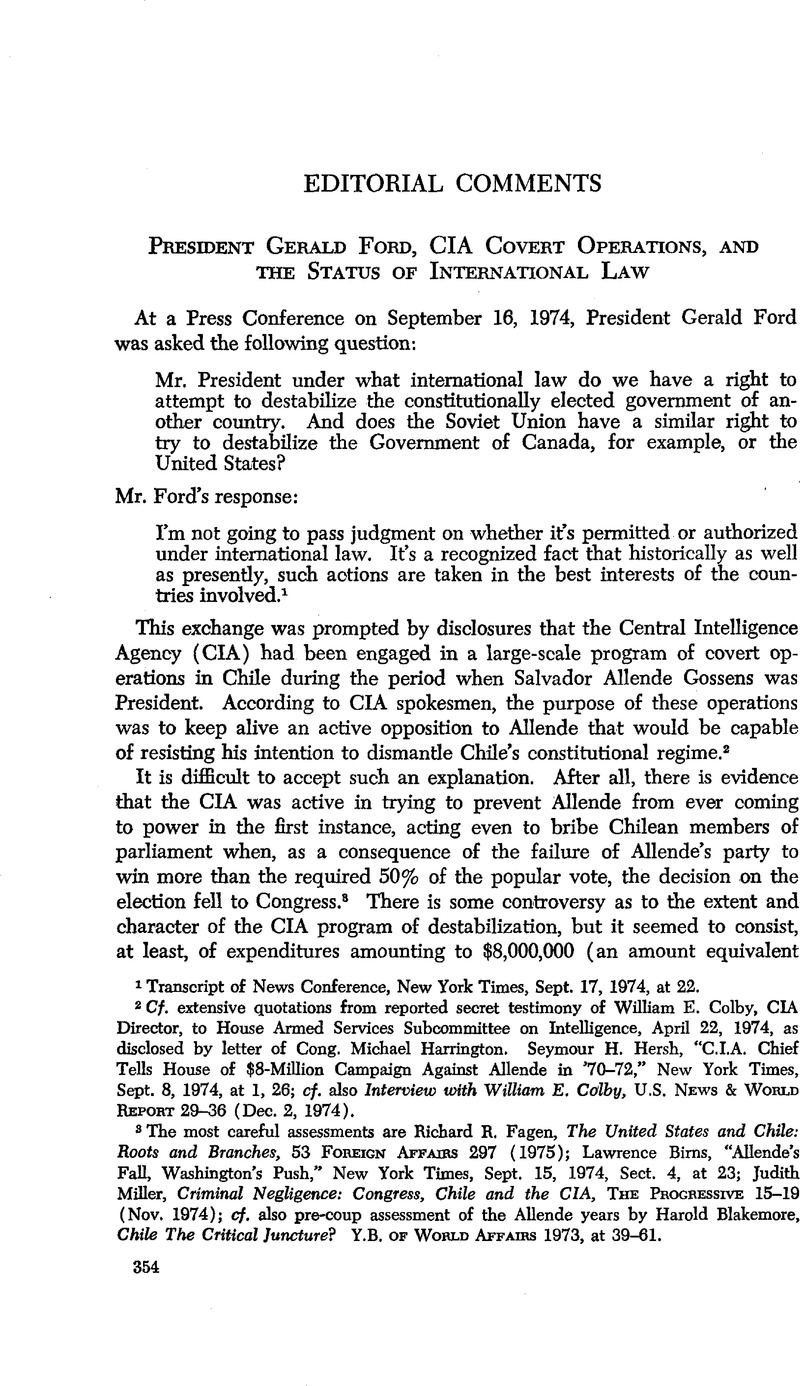Published online by Cambridge University Press: 28 March 2017

1 Transcript of News Conference, New York Times, Sept. 17, 1974, at 22.
2 Cf. extensive quotations from reported secret testimony of William E. Colby, CIA Director, to House Armed Services Subcommittee on Intelligence, April 22, 1974, as disclosed by letter of Cong. Michael Harrington. Seymour H. Hersh, “C.I.A. Chief Tells House of $8-Million Campaign Against Allende in ‘70-72,” New York Times, Sept. 8, 1974, at 1, 26; cf. also Interview with Colby, William E., U.S. News & World Report 29-36 (Dec. 2, 1974)Google Scholar.
3 The most careful assessments are Fagen, Richard R., The United States and Chile: Roots and Branches, 53 Foreign Affairs 297 (1975)CrossRefGoogle Scholar; Lawrence, Birns, “Allende’s Fall, Washington’s Push,” New York Times, Sept. 15, 1974, Sect. 4, at 23 Google Scholar; Judith, Miller, Criminal Negligence: Congress, Chile and the CIA, The Progressive 15-19 (Nov. 1974)Google Scholar; cf. also pre-coup assessment of the Allende years by Harold, Blakemore, Chile The Critical Juncture? Y.B. of World Affairs 1973, at 39-61 Google Scholar.
4 On the character of United States overt policy of opposition to the Allende government, see Petras, James F. and Robert, LaPorte Jr., Can We Do Business with Radical Nationalists? Chile: No, 7 Foreign Policy 132-58 (1972)Google Scholar; Elizabeth, Fainsworth, Chile: What Was the U.S. Role? (J) More Than Admitted, 16 Foreign Policy 127-41 (1974)Google Scholar, and Paul Sigmund, Chile: What Was the U.S. Role? (2) Less Than Charged, id., 142-56.
5 Verified by William Colby in his interview with U.S. News & World Report, cited note 2.
6 Secretary Kissinger, Interviewed for New York Times, 71 Dept. State Bull. 629-42, at 639 (1974)Google Scholar.
7 For a more extended analysis of Secretary Kissinger’s views on these matters, see Falk, What’s Wrong with Henry Kissinger’s Foreign Policy, Policy Memorandum No. 39, Princeton University Center of International Studies, 1-36 (July 1974); for a positive rationale, see book by a former diplomat who helped organize the CIA: Miles O. Copeland, the Game of Nations (1969).
8 When the editors of U.S. News & World Report asked Mr. Colby about covert operations in Chile prior to the downfall of Allende, his response revealed an interesting shift in emphasis from that chosen by the President at his News Conference. Mr. Colby said: “. . . it’s a matter of the United States taking a decision that a certain course of action is important in the best interests of our country, and friendly elements in others” (emphasis added). Supra note 2, at 29. I suspect that what Mr. Colby said is more descriptive of the U.S. motivations than is the more altruistically phrased explanation by the President.
9 The original American support for sanctions against Castro’s Cuba was based on the allegation that the Cuban Government was “destabilizing” the public order of other Latin American countries, and that such undertakings were in flagrant disregard of minimal respect for the international legal order.
10 Moore, J. N., Law and National Security, 51 Foreign Affairs, 408-21, at 409 (1973)Google Scholar; see related approach in Cottam, Richard W., Competitive Interference and 20th Century Diplomacy (1967)Google Scholar.
11 It is possible that Professor Moore’s rationale would be accepted on pragmatic grounds in policy-justifying settings so as to reduce public criticism and opposition of official policy actions.
12 Cf. also Secretary Kissinger’s repeated reluctance to acknowledge the bindingness of even domestic legal constraints on discretion in the context of arguing about the future of American military assistance to Turkey. The argument centers on whether the legislative aid cutoff should be applied as a consequence of Turkish use of American equipment to carry out its 1974 invasion of Cyprus rather than, as authorized, for defense against aggression. For accounts and commentary see New York Times, Sept. 4, 1974, at 4 and Dec. 2, 1974, at 7; see also editorial commenting on “Dr. Kissinger’s Defense of Administration Law-winking” in Washington Post, Sept. 26, 1974, at A-22.
13 For a discussion along these lines, see Falk, , CIA Covert Operations and International Law,” to be published in 1975 in the magazine Society.Google Scholar Background information is contained in Victor, Mahchetti and Marks, John D., The CIA and The Cult of Intelligence, esp. 107-32 (1974)Google Scholar.
14 A complementary argument stressing the incompatibility between CIA covert operations and the domestic basis of an effective foreign policy has been developed in persuasive form by Katzenbach, Nicholas deB., Foreign Policy, Public Opinion, and Secrecy, 52 Foreign Affairs 1-19 (1973)CrossRefGoogle Scholar.
15 In fact, I believe that CIA covert operations contributed to a result in Chile that served neither the best interests of the Chilean or American people, and that generally, the CIA has aligned itself with rightist, antidemocratic forces in foreign societies. Furthermore, although it is not an ingredient of the legal argument, I believe that this pattern of alignment, which is not without an exception here and there, has worked against the dynamics of national self-determination.
16 See Bernard, Weinraub, “Kissinger Assures India that CIA Won’t Interfere,” New York Times, Oct. 31, 1974, at 12 Google Scholar.
17 Reported in account of Mr. Carlucci’s confirmation hearings, New York Times, Nov. 27, 1974, at 10.
18 For the most persuasive argument on the positive correlation between adherence to principles of nonintervention and the quality of international order, see Vincent, R. J., Nonintervention and International Order (1974)Google Scholar.